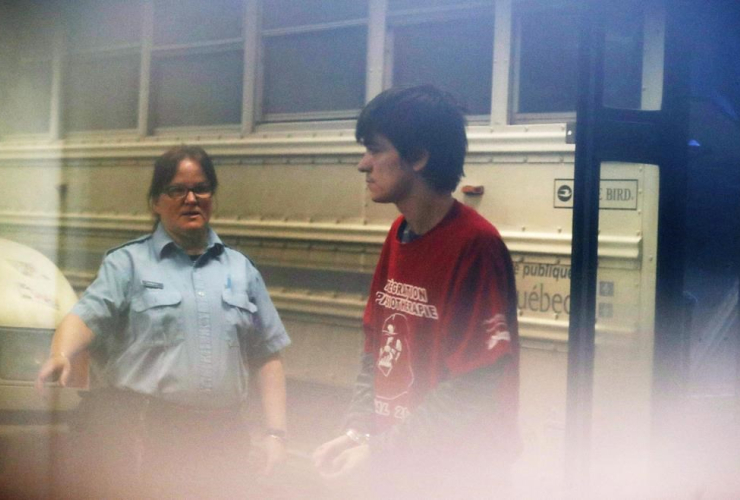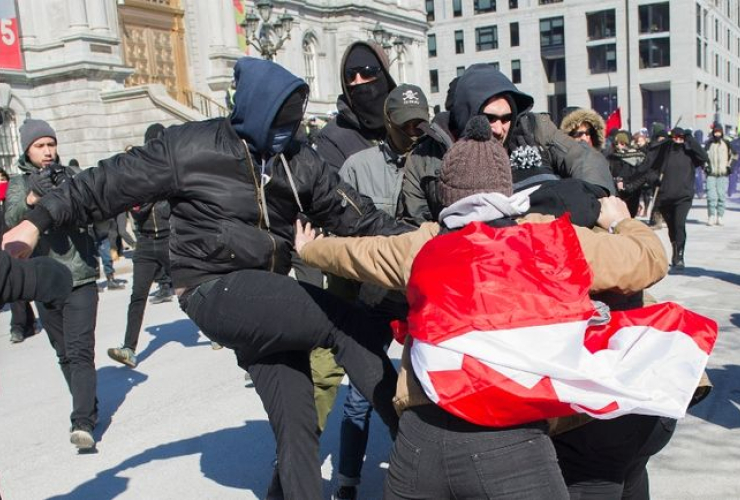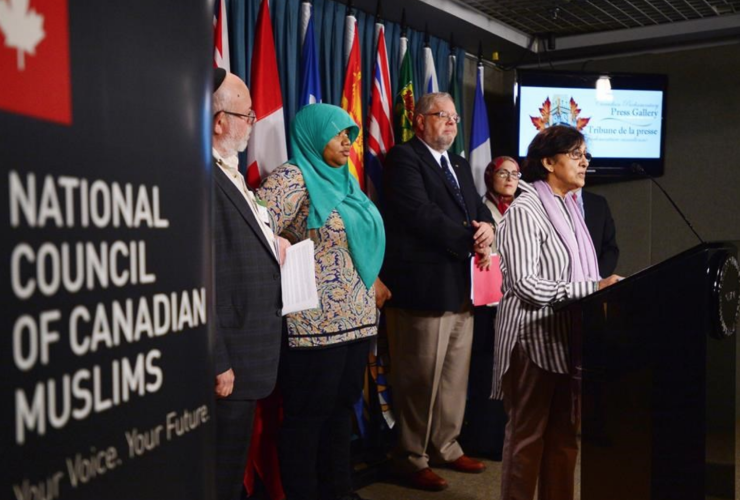There has been a disturbing spike of hate crimes in Canada, with attacks against Canadian Muslims more than doubling, new figures show.
The record high of 2,073 police-reported hate crimes in 2017 was largely the result of a surge in property hate crimes like graffiti and vandalism, Statistics Canada said Thursday, and comes as Muslims are being targeted with increased ferocity.
Attacks against Muslims jumped 207 per cent last year in Ontario, and almost tripled in Quebec, where reports of hate crimes peaked in the month after Alexandre Bissonnette murdered six Muslim men at the Islamic Cultural Centre in Quebec City on Jan. 29, 2017.
Last year, there were 664 more hate crimes nationwide than in 2016, a rise of 47 per cent. That is a much larger year-over-year increase than the growth of hate crimes in Canada between 2015 and 2016, and represents the fourth year in a row that these type of crimes have increased.
Muslims in Quebec have expressed concerns that the issue has been flaring up due to a series of other incidents and developments, including a false report last December by a major television newscast, TVA Nouvelles, that incorrectly suggested two mosques had asked to have female construction workers removed from a site.
More recently, Quebec Premier François Legault has pledged to move "very quickly" on a plan to ban religious symbols in the workplaces of public servants who interact directly with the population, such as teachers. This move is largely considered to be singling out Muslim women who wear a veil.
The premier has also said he's willing to invoke the notwithstanding clause of Canada's Constitution to override rights in order to proceed with his proposed ban.
The Trump effect
In Canada, it is illegal to advocate genocide, incite hatred publicly, and promote hate willfully. It is also illegal in Canada to engage in hate-motivated mischief related to property. The term “police-reported” means a criminal incident that was investigated by law enforcement and found to have been motivated by hatred of a specific group.
Leila Nasr, communications coordinator at the National Council of Canadian Muslims, said in an interview that the Statistics Canada data paralleled what her organization had been seeing in terms of anti-Muslim discrimination, particularly as U.S. President Donald Trump campaigned for the presidency.
Trump repeatedly attacked Muslims and refugees on the campaign trail, calling in December 2015 for a "total and complete shutdown of Muslims entering the United States," and referring to Syrian refugees as a "Trojan horse" in September 2016.
Bissonnette searched for Trump over 800 times between Jan. 1, 2017 and the day he walked into the Quebec City mosque and opened fire. “Things here (in Canada) don’t happen in a complete vacuum," Nasr said. "Trump was inaugurated in January 2017, and we saw very clearly what that resulted in."

Bernier rhetoric 'problematic' says Muslim Council
Bissonnette also told investigators he went to the mosque in order to protect his family from terrorist attacks, because terrorists had killed people throughout Europe. He "lost it" after hearing on the news that Canada was preparing to take in more refugees.
Nasr said it's fair to say anti-refugee rhetoric circulating in Canadian society is "very much connected" with the spike in hate crimes.
The Statistics Canada data doesn't reflect crimes against people or groups based on perceived identity, she noted — so this kind of discriminatory speech "can play into the perception that an Arab person or a Southeast Asian person, that they may be a Muslim and therefore attacked on that basis."
Refugee claimants are an extremely small portion of the Canadian population, at 0.13 per cent, according to the United Nations refugee agency in Canada. There were 50,000 people who claimed asylum in Canada in 2017, about the same as the number of Rohingya who fled across the Bangladesh border in a single day, the agency said, and representing less than 0.2 percent of global refugees last year.
Nevertheless, refugees have become a major political issue in Canada. Maxime Bernier, a federal member of Parliament who quit the Conservatives to start the People's Party of Canada, has said he would like fewer refugees in Canada. He has also said it is "totally unrealistic" to think Canada can "solve" global migration by welcoming more refugees.
This week, the MP for the Quebec riding of Beauce suggested "mass migration" isn't a "normal thing that is beneficial to all." He has also confirmed he spoke with the leader of a far-right group that wants to block immigrants based on ethnicity. Bernier has said he was unfamiliar with the group's beliefs, and he has declared that bigots aren't welcome in his party.
But in light of the spike in hate crimes, Nasr said, Bernier's rhetoric is "certainly problematic for the public discourse.”
“This kind of rhetoric has always been part of the political discourse in Canada, whether it’s against Indigenous people, against Black people, against Jewish people. Unfortunately now it happens to predominantly focus around Arabs, around Muslims and other people who have shared characteristics," she said.
“I think we’ve seen clearly that when our politicians polarize our society — they take a polar angle on things, and say ‘these people are Canadians, these people are others’ — that has a serious implication for what we see in our hate crime data. It really tells us that the words of our elected officials matter."
People's Party of Canada spokesman Martin Masse rejected the argument that Bernier's language was problematic. "He is discussing a relevant public policy issue and taking a legitimate stand on it." Masse said.
Because the federal government sets immigration policy, he added, "it makes no sense to claim that fewer is the only 'problematic' or 'polarizing' position, while more is non-problematic and non-polarizing."
National Observer had asked Nasr about Bernier's comments. But Masse said Nasr was in fact the one who was "irresponsibly politicizing the issue by referring to Mr. Bernier in this discussion, since there is simply zero connection between him and these hate crime statistics."

Canadians 'should be vigilant in standing against hate'
The rise in hate crimes comes as University of Ontario Institute of Technology researcher Barbara Perry has documented a Canadian rise in right-wing extremist groups.
The record of 2,073 police-reported hate crimes in Canada in 2017 is up from 1,409 in 2016, 1,362 in 2015, 1,295 in 2014 and 1,167 in 2013.
Statistics Canada said the largest increase in hate crimes happened in Ontario, where there were 1,023 such incidents in 2017, or 411 more than 2016, which is a 67 per cent increase. Quebec saw 162 more hate crimes in 2017 than in 2016, rising to 489 total. Hate crimes against Canadian Muslims there went from 41 in 2016 to 117 in 2017.
Overall, there were 349 hate crimes against Canadian Muslims last year across the country, or 210 more than in 2016, an increase of 151 per cent.
Ontario saw a 84 per cent rise targeting Black Canadians and a 41 per cent rise targeting Jewish Canadians. Across Canada there were 107 more hate crimes targeting Black Canadians, the most common race or ethnicity attack, and 30 more targeting Arab or West Asian Canadians.
The Centre for Israel and Jewish Affairs released a statement Thursday calling on federal officials to take action following the Statistics Canada report.
“While most Canadians reject antisemitism and all forms of bigotry, we are alarmed to see yet another spike in hate crimes against the Jewish community and other groups in Canada," said CEO Shimon Koffler Fogel.
"It is disturbing to think an antisemitic hate crime takes place every 24 hours in our country. History demonstrates that those who target Jews and other minorities pose a threat to society as a whole. All Canadians should be vigilant in standing against hate."
Hate crimes targeting sexual orientation also climbed, from 176 incidents in 2016 to 204 in 2017, the second time in a year they rose. Compared with other types of hate crime, there were a higher proportion of violent crimes directed at sexual orientation.






Comments